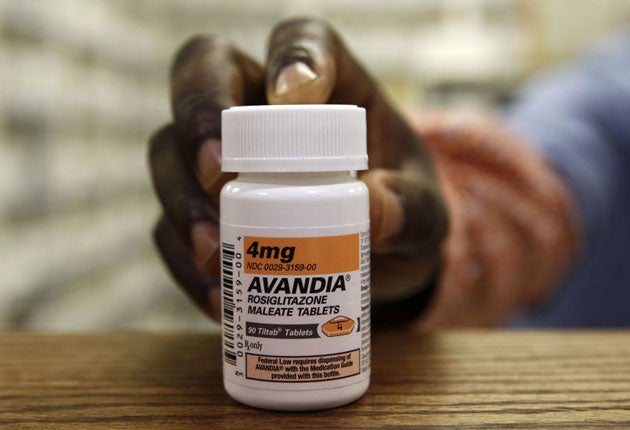Diabetes drug with heart attack link 'should never have been issued'
'British Medical Journal' says Avandia should be withdrawn from the UK market. Jeremy Laurance reports

One of the world's biggest-selling drugs for diabetes should never have been licensed and should now be withdrawn, says the British Medical Journal. It says its investigation into concerns about the drug, Avandia, made by British multinational GlaxoSmithKline, which has been linked with increased heart attacks, are too great to allow its continued use.
The BMJ claims that the UK drug regulator, the Medicines and Healthcare Products Regulatory Authority, was advised by the Commission on Human Medicines to withdraw the drug last July, but it remains on the market because the European Medicines Agency, which licenses drugs across Europe, has yet to reach a decision on Avandia, whose chemical name is rosiglitazone. The advice from the Commission said the "risks of rosiglitazone outweigh its benefits and it no longer has a place on the UK market".
Fiona Godlee, editor-in-chief of the BMJ, said the drug "should not have been licensed and should now be withdrawn". She called for "more robust regulatory processes and better access to the raw data used to license drugs to allow scrutiny by the scientific community".
Avandia is also the subject of a BBC Panorama programme, to be broadcast tonight, which is expected to raise similar concerns about the drug regulatory process. GSK disputes the BMJ's allegations. It has previously maintained that its trials were conducted responsibly and that the drug is safe when adminstered correctly.
When Avandia was lauched in the UK in 2000, the drug was hailed as a turning-point in the treatment of diabetes . It was one of the first of a new class of drugs for the condition – called glitazones – to be developed since the 1950s. Sales soared until 2007 when a review in the New England Journal of Medicine showed a significant increase in the risk of heart attack associated with the drug.
The BMJ investigation, based on documents obtained under the Freedom of Information Act, concluded there was a "paucity of evidence" during the European approval process a decade ago, and some experts involved in the process were concerned about long-term risks and benefits.
The report also raises concerns about the quality of the data used by GSK to show that rosiglitazone did not lead to increased heart problems compared to other diabetes drugs, the lack of publicly available trial results for independent scientific scrutiny, a lack of transparency in the European system, and the ability of the European regulator to assess individual patient data.
Since July, the MHRA has advised doctors in the UK to consider alternative treatments where appropriate. Those at a higher risk of heart disease should be advised to stop taking the drug. The same month, a panel of 33 medical experts, convened by the US Food and Drugs Administration, concluded, after a two-day hearing, that Avandia was safe enough to stay on the market. Last March, after research by the Mayo Clinic in Minnesota, which does not rely on commercial sponsorship, the BMJ said nine out of 10 scientists who backed Avandia had financial links to the pharmaceutical industry. Fewer than 30 per cent of those with financial links with the industry expressed "unfavourable views" of Avandia. The research did not suggest any attempt by GSK to influence the debate.
The BMJ today says: "The scandal of rosiglitazone lies in the fact that we were prescribing the drug to reduce the serious consequences of Type 2 diabetes, the most important of which is myocardial infarction [heart attack]. Yet because no licensing body demanded evidence of effect on cardiovascular risk at the time of licensing, 10 years after the release of rosiglitazone we still cannot accurately quantify the harm to which we were exposing our patients."
GSK said: "GSK has carried out an extensive research programme involving more than 50,000 patients to analyse the safety and benefits of rosiglitazone. No other diabetes medicine introduced in the past 10 years has such an extensive safety database. We reject any suggestion that there is a lack of publicly available trial results related to rosiglitazone for independent scientific scrutiny."
Subscribe to Independent Premium to bookmark this article
Want to bookmark your favourite articles and stories to read or reference later? Start your Independent Premium subscription today.

Join our commenting forum
Join thought-provoking conversations, follow other Independent readers and see their replies